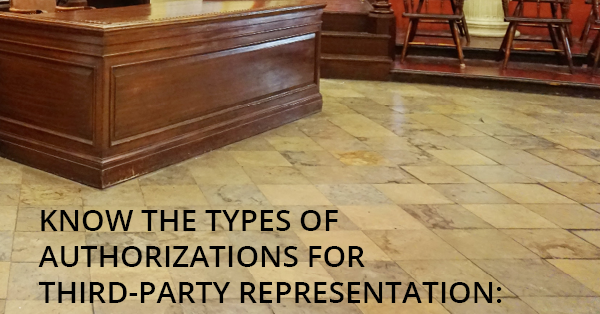KNOW THE TYPES OF AUTHORIZATIONS FOR THIRD-PARTY REPRESENTATION:

When working with the IRS, taxpayers have a right to represent themselves. They can also choose a third-party agent to represent them, like a tax professional or family member. Taxpayers should be sure that their representative is authorized to practice before the IRS.
Taxpayers who want to have a third party represent them must formally grant them permission to do so.
What the right to retain representation means for taxpayers:
- Taxpayers have the right to retain an authorized representative of their choice to represent them in their dealings with the IRS.
- Taxpayers who are heading to an interview with the IRS may select someone to represent them.
- Taxpayers who retain representation don't have to attend with their representative unless the IRS formally summons them to appear.
- In most situations, the IRS must suspend an interview if the taxpayer requests to consult with a representative, such as an attorney, certified public accountant or enrolled agent.
- Any attorney, CPA, enrolled agent, enrolled actuary or other person permitted to represent a taxpayer before the IRS, who's not disbarred or suspended from practice before the IRS, may submit a written power of attorney to represent a taxpayer before the IRS.
- Taxpayers have the right to seek assistance from an LITC if they cannot afford representation. They can find a LITC near them by visiting the Low Income Taxpayer Clinics page or by calling the IRS toll-free at 800-829-3676.
LITCs are independent from the IRS and the Taxpayer Advocate Service These clinics represent individuals whose income is below a certain level and who need to resolve tax problems with the IRS. LITCs can represent taxpayers in audits, appeals and tax collection disputes before the IRS and in court. In addition, LITCs can provide information about taxpayer rights and responsibilities in different languages for individuals who speak English as a second language. Services are offered for free or a small fee.
Here are different types of third-party authorizations:
- Power of Attorney - Allows someone to represent a taxpayer in tax matters before the IRS. The representative must be an individual authorized to practice before the IRS.
- Tax Information Authorization- Appoints anyone to review or receive a taxpayer’s confidential tax information for the type of tax for a specified period.
- Third Party Designee- Designates a person on the taxpayer’s tax form to discuss that specific tax return and year with the IRS.
- Oral Disclosure- Authorizes the IRS to disclose the taxpayer’s tax info to a person the taxpayer brings into a phone call or meeting with the IRS about a specific tax issue.
Even with an authorized third party representing them, taxpayers are ultimately responsible for meeting their tax obligations.




